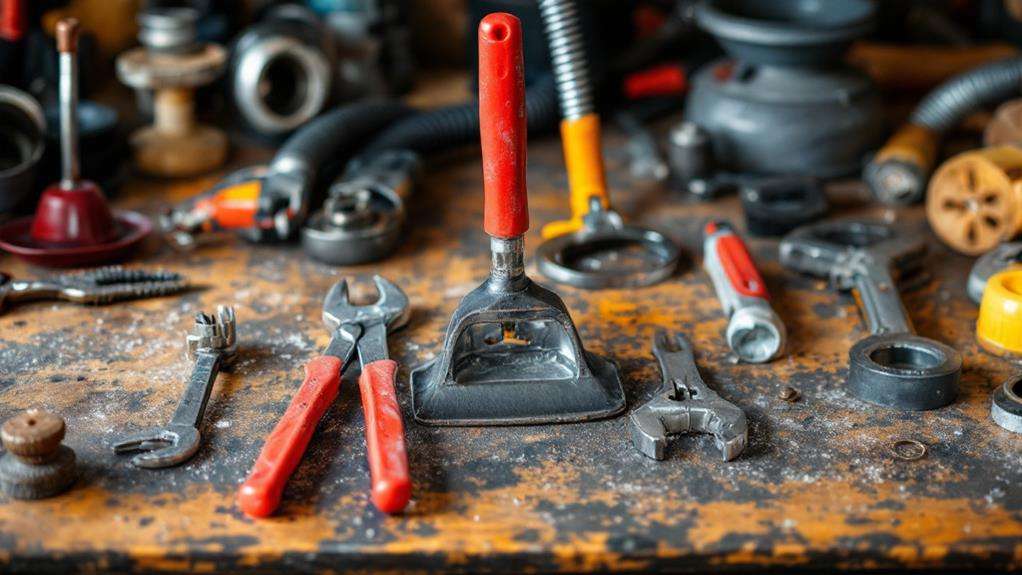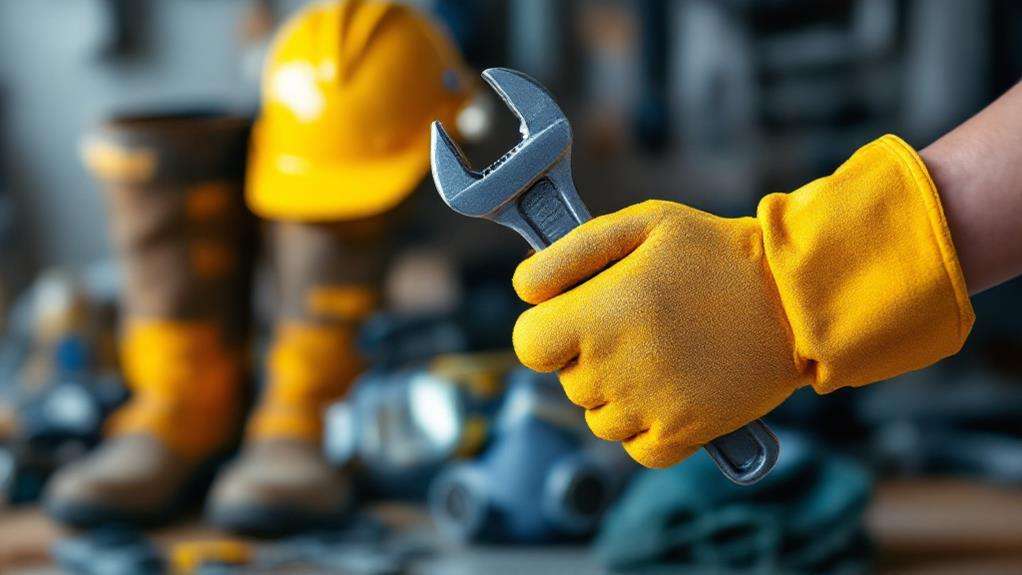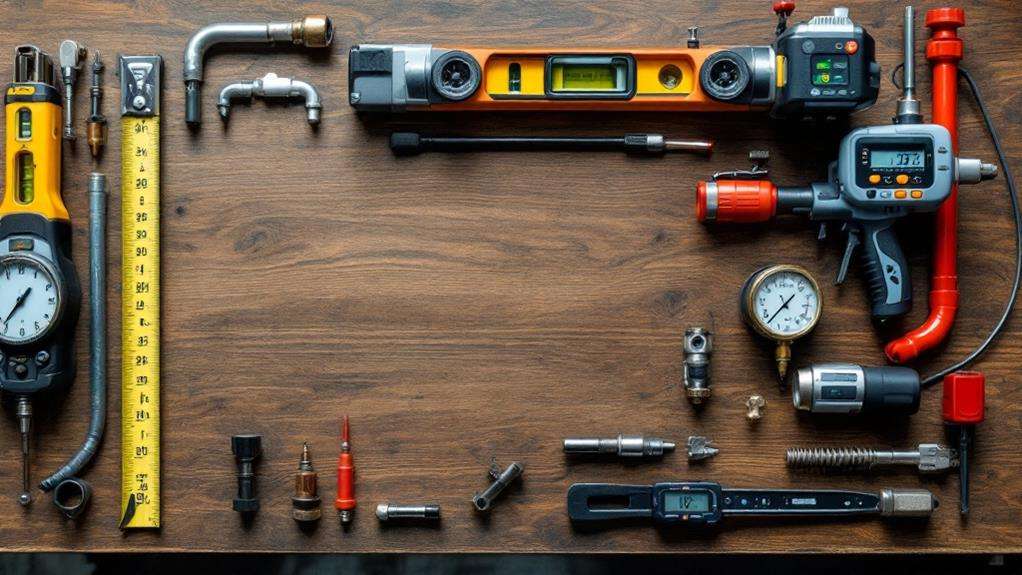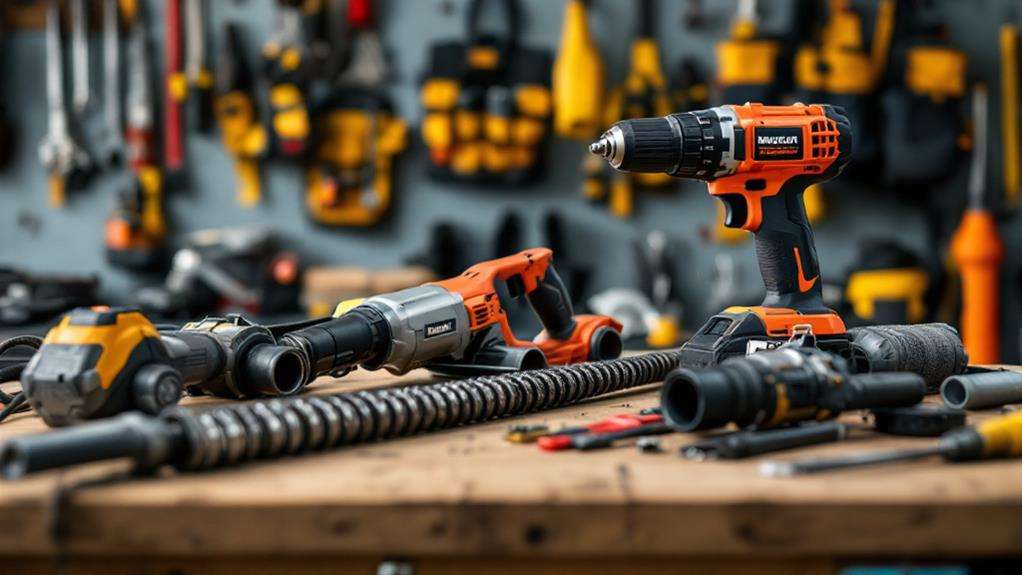The Complete List of Tools Needed for Basic Plumbing Repairs
To tackle basic plumbing repairs, you'll need a well-equipped toolbox. Start with essential wrenches: pipe, basin, adjustable, and faucet key. Include pipe cutters, hacksaws, and tubing cutters for shaping pipes. Don't forget drain-clearing tools like plungers and augers. Specialized tools such as basin wrenches and water pump pliers are indispensable. Always prioritize safety with goggles, gloves, and work boots. Stock up on sealants, adhesives, and measurement devices like tape measures and levels. For joining pipes, have press fitting systems and soldering supplies ready. Power tools and miscellaneous accessories complete your arsenal. Immerse yourself to become proficient in the art of plumbing repairs.
Essential Wrenches for Plumbing
When tackling basic plumbing repairs, you'll need the right tools for the job. One of the most essential tools is the pipe wrench, the largest wrench in a plumber's arsenal. Available in various lengths, you'll often use these in pairs to tighten and loosen nuts and fittings on pipes.
For working in tight spaces, particularly around faucets, you'll want a basin wrench. This T-shaped tool provides excellent control and influence in confined areas. Don't forget the versatile adjustable wrench, commonly available in 6-inch and 10-inch sizes, which is perfect for tightening and loosening hexagonal nuts and fittings.
When dealing with outdoor spigots and valves, a faucet key is indispensable. This small, X-shaped tool gives you precise control when turning water sources on and off. For ensuring proper tension and preventing leaks, you'll need a torque wrench. This specialized tool allows you to tighten nuts and fittings to specific torque settings during plumbing installations.
Pipe Cutting and Shaping Tools
Three essential tools for cutting and shaping pipes are the pipe cutter, hacksaw, and tubing cutter. When you're working on plumbing projects, you'll need these tools to make precise cuts in various types of pipes.
The pipe cutter is ideal for cutting through copper and steel pipes. It features a cutting wheel that scores the pipe as you rotate it, creating a clean, even cut. For PVC pipes, you'll want to use a hacksaw, which allows you to make quick cuts through plastic materials. The tubing cutter is perfect for smaller diameter pipes and can create smooth, precise cuts in copper tubing.
In addition to these primary tools, you'll find a hole saw useful for cutting large circular openings in pipes or fixtures. This tool attaches to a drill and can create clean holes for installing new fittings or connections.
For bending pipes, you'll need a pipe bender. This tool allows you to create smooth curves in copper or steel pipes without kinking or damaging them. By using the appropriate tools for each job, you'll guarantee clean, accurate cuts and bends in your plumbing work.
Drain Clearing Equipment

Plumbers rely on a variety of specialized tools to tackle stubborn drain clogs. A plumber's snake, also known as a hand auger or drain snake, is a versatile tool that can dislodge blockages in pipes. For tougher clogs, you might need an electric drain auger, which provides more power and reach to break apart stubborn obstructions.
Don't underestimate the effectiveness of plungers for clearing simple clogs in sinks, showers, and toilets. These essential tools create suction to dislodge blockages quickly. When you can't see the problem, inspection cameras or borescopes allow you to visually examine the interior of pipes, helping you identify the exact location and nature of the clog.
For heavy-duty cleaning, hydro-jets use high-pressure water to scour pipe interiors, removing built-up debris and scale. While not typically used for basic repairs, they're crucial for severe blockages. Remember, drain clearing equipment isn't limited to these specialized tools. You'll also need pipe wrenches and basin wrenches to access and manipulate plumbing fixtures. By having a well-stocked toolkit with these drain clearing essentials, you'll be prepared to tackle most common plumbing issues efficiently.
Specialized Plumbing Hand Tools
A plumber's toolkit isn't complete without specialized hand tools designed for specific tasks. You'll need a variety of wrenches, pliers, and faucet keys to tackle most plumbing jobs effectively. Basin wrenches are T-shaped tools that allow you to work on faucets in tight spaces, providing better control and influence when loosening and tightening nuts. For larger pipework, you'll rely on pipe wrenches, typically used in pairs to handle nuts and fittings.
Adjustable wrenches offer versatility, allowing you to tighten and loosen hexagonal nuts and fittings on pipes of various sizes. When dealing with spigots and sillcocks, faucet keys come in handy for precise control when turning water sources on and off. Don't forget about pliers, also known as water pump pliers, which are essential for accessing tight spaces where wrenches won't fit.
These specialized plumbing hand tools are indispensable for:
- Repairing leaky faucets
- Installing new fixtures
- Maintaining pipework
- Addressing emergency plumbing issues
Safety Gear for Plumbers

Why risk your health and safety when tackling plumbing jobs? Equipping yourself with proper safety gear is indispensable for protecting your well-being while working on plumbing projects. Start with a pair of slip-resistant work boots to maintain stability and traction on wet surfaces, reducing the risk of falls and injuries.
Don't forget to shield your eyes from flying debris and splashing water by wearing safety goggles. These will help you maintain clear vision while working on pipes and fixtures. Protect your hands from harsh chemicals and hot pipes by donning a pair of durable rubber gloves.
If you're using power tools, hearing protection is vital to safeguard your ears from loud noises that can cause long-term damage. When working on construction sites or areas with overhead hazards, always wear a hard hat to protect your head from falling objects.
Plumbing Sealants and Adhesives
With your safety gear in place, it's time to focus on the materials that make plumbing repairs possible. Plumbing sealants and adhesives are vital for creating leak-proof connections and watertight seals. You'll need to familiarize yourself with several key products:
- Thread sealing tape (plumber's tape)
- Plumber's putty
- Silicone caulk
- Epoxy adhesives
Thread sealing tape, also known as plumber's tape or Teflon tape, is pivotal for wrapping around threaded pipe fittings to prevent leaks. It's thin, lightweight, and creates a tight seal on threaded connections. Plumber's putty is a pliable, oil-based sealant used to establish watertight seals around sink drains and faucet bases. For filling gaps and cracks around bathroom fixtures, silicone caulk is your go-to waterproof sealant. It's flexible and ideal for tubs, showers, and sinks. When you need a strong, waterproof bond for repairing cracks, holes, or leaks in pipes and fittings, epoxy adhesives are your best bet. By keeping these sealants and adhesives in your toolkit, you'll be ready to tackle a wide range of plumbing repairs and guarantee leak-free, long-lasting connections.
Measurement and Inspection Devices

Accurate measurements and thorough inspections are the backbone of successful plumbing repairs. You'll need a reliable tape measure to precisely gauge pipe lengths and openings, ensuring you get the right materials for your job. Don't forget a level to guarantee your pipes are installed plumb, preventing potential drainage issues down the line.
For those hard-to-reach areas, an inspection camera with a flexible cable is extremely valuable. You'll be able to visually assess hidden pipes and drains, quickly identifying blockages or damage without invasive procedures. An infrared thermometer is another handy tool, allowing you to check temperatures of pipes, water heaters, and other plumbing components instantly.
When you're dealing with mysterious water losses, a leak detector using ultrasonic technology can be a transformative tool. You'll locate hidden leaks in pipes efficiently, saving time and preventing extensive damage. These measurement and inspection devices are essential for diagnosing plumbing issues accurately and planning effective repairs. By incorporating these tools into your arsenal, you'll approach each plumbing task with confidence, knowing you have the means to assess and address problems thoroughly.
Pipe Joining and Fitting Tools
Once you've measured and inspected your plumbing system, you'll need the right tools to join pipes and fittings. Professional plumbers rely on a variety of specialized tools to create secure connections in different types of pipes. Your plumbing tools list should include equipment for various joining methods:
- Press fitting systems for quick, reliable connections
- Tools for creating threaded joint connections
- Supplies for soldering copper pipes
- PEX crimp tools for flexible plastic piping
For threaded connections, you'll need pipe wrenches, thread cutters, and sealing tape. When working with copper pipes, invest in a propane torch, flux, and solder. PEX systems require specialized crimping tools and rings. Don't forget about Push-to-Connect Fittings Removal tools for easy disassembly when needed.
Pipe cutters are essential for preparing pipes of all materials. You'll also want a good set of pliers and a basin wrench for hard-to-reach connections. Keep various pipe fittings on hand, such as elbows, couplings, and adapters. With these pipe joining and fitting tools in your arsenal, you'll be well-equipped to handle most basic plumbing repairs and installations efficiently.
Power Tools for Plumbing Jobs

Power tools [MODIFY: alter] the manner in which plumbers tackle various jobs, making tasks faster, easier, and more efficient. You'll find that a power drill is indispensable for your plumbing toolkit. Equipped with specialized bits and attachments, it's perfect for drilling holes, driving screws, and operating pipe-cutting tools. When you're dealing with tough materials like concrete or masonry, you'll need the extra force provided by rotary hammers and impact drivers.
For cutting through metal pipes, PVC, and other materials during demolition or repairs, you can't go wrong with a reciprocating saw, also known as a Sawzall. It's a versatile tool that'll save you time and effort. An angle grinder with appropriate cutting discs is another must-have for grinding, shaping, and trimming pipes and fittings.
To [MODIFY: guarantee] maximum mobility and convenience, opt for cordless, rechargeable versions of these power tools. They'll allow you to work efficiently in various settings without being tethered to a power outlet. By investing in these essential power tools, you'll be well-equipped to handle a wide range of plumbing tasks with ease and precision.
Miscellaneous Plumbing Accessories
While power tools are priceless for major plumbing jobs, you'll find that a range of smaller accessories can make your work much easier and more efficient. These miscellaneous plumbing accessories are often overlooked but can be vital for completing repairs effectively. Some essential items include a caulk gun and silicone for sealing, quality thread sealing tape (also known as plumbers tape) for preventing leaks, and a nipple extractor for removing broken pipe fittings.
Don't forget to stock up on these additional plumbing supplies:
- Deburring tools to smooth rough edges on cut pipes
- Hole saws for creating precise openings in various materials
- Tube benders for shaping copper pipes without kinking
- Internal PVC pipe cutters for making clean cuts in tight spaces
These accessories will help you tackle a wide range of plumbing tasks, from fixing leaks to installing new fixtures. They'll also enable you to work more precisely, ensuring better water pressure and preventing future issues. By keeping these tools on hand, you'll be prepared for most basic plumbing repairs and can save time and money by avoiding emergency calls to professionals.
